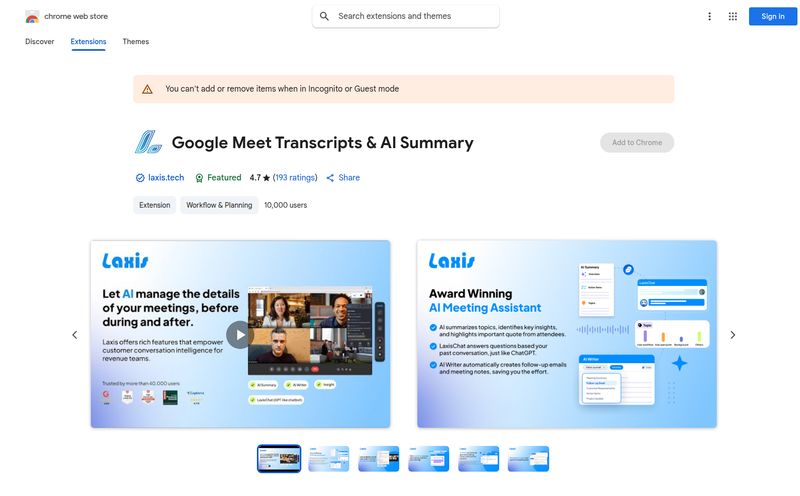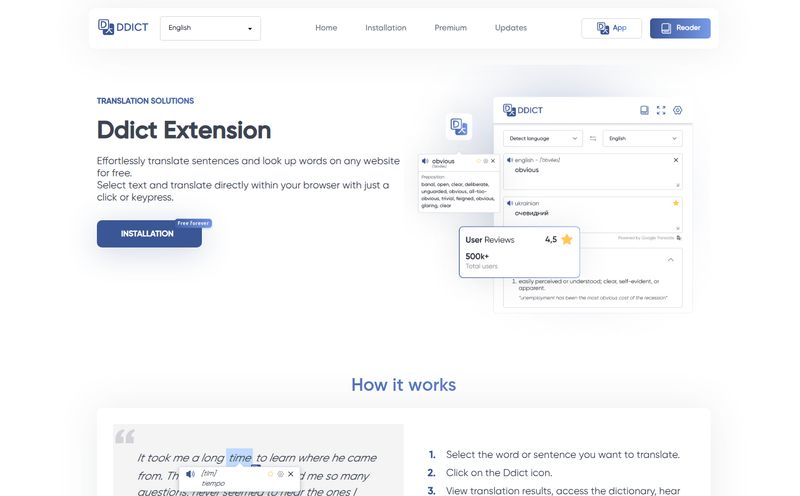You see a game on Steam. It looks cool. The trailer is epic. The screenshots are slick. You scroll down and see that little blue box:
Mostly Positive.
What does that even mean? It’s the most non-committal rating in the history of ratings. It's the "I guess so" of video game feedback. So you do what any responsible gamer with a finite amount of money does. You start scrolling through the reviews.
An hour later, your eyes are glazed over. You’ve read a 5,000-word essay from a guy with 3,000 hours in-game who hates the latest patch, a one-sentence joke review that has 10,000 awards, and a dozen arguments about whether the developers are geniuses or hacks. You're no closer to a decision. In fact, you're probably more confused.
I’ve been there. We've all been there. It’s analysis paralysis, gaming edition. That’s why when I stumbled upon a simple little tool called Steam Summarize, my curiosity was definitely piqued.
So, What Exactly is Steam Summarize?
Think of it as the Cliff's Notes for game reviews. It’s a website with one job: to take the giant, chaotic mess of Steam reviews for any given game and distill it into a quick, easy-to-read summary. And it does this using AI.
The whole thing is powered by GPT-4, the same brain behind a lot of the AI magic you’ve been hearing about. The site is refreshingly simple. There’s no login, no cookies (they claim), no pop-ups, no nonsense. Just a search bar waiting for you to type in a game title.
The privacy part is a nice touch, I have to admit. In a world where every click is tracked, a tool that just does its job and leaves you alone feels like a breath of fresh air. It's not trying to sell you anything or build a profile on you; its just trying to save you some time.
How This Thing Actually Works
The beauty of Steam Summarize is its simplicity. The website lays it out in three steps, and honestly, there isn't much more to it.
- You search for a game. You just type the name, like "Elden Ring" or "Baldur's Gate 3," into the search box.
- It fetches the reviews. The tool uses Steam's public API—which is basically a public doorway into Steam's data—to grab a bunch of the most recent reviews for that game.
- GPT-4 summarizes them. This is the AI part. It reads through all that text and spits out a summary of the general consensus. It looks for common praises, recurring complaints, and the overall sentiment of the players.
And... that's it. Dead simple, as the site itself says. No fluff. It’s designed to be a scalpel, not a Swiss Army knife.

Visit Steam Summarize
Putting It to the Test - My Honest-to-Goodness Experience
Of course, I had to take it for a spin. I decided to throw a few different types of games at it to see how it would handle them.
First up: Cyberpunk 2077. The perfect test case. A game with a disastrous launch and a legendary redemption arc. The reviews are a wild mix of old anger and new praise. The summary I got was surprisingly good. It correctly identified that many players praise the story, world-building, and the massive improvements from the 2.0 update and Phantom Liberty expansion, while also noting that some lingering bugs and performance issues are still mentioned. It caught the nuance. Color me impressed.
Next, I tried a smaller, beloved indie title: Stardew Valley. This was more of a softball, since the reviews are overwhelmingly positive. The summary was, as expected, a glowing report about the relaxing gameplay, charming characters, and constant free updates from the developer. It worked, but it didn't tell me much I didn't already know.
Finally, I searched for a game with a truly "Mixed" rating. The summary accurately reflected the division, pointing out that players who love a specific, punishing type of gameplay adore it, while others find it frustratingly obtuse. This is where the tool really shines—deciphering those confusing "Mixed" or "Mostly Positive" tags.
The Good, The Bad, and The AI
No tool is perfect, right? Especially not a free one using brand-new tech. After playing around with it for a while, here's my breakdown.
What I Really Liked
The speed is the biggest win. Getting a general vibe check on a game in 10 seconds instead of 30 minutes is a huge quality-of-life improvement. The interface is clean and straightforward, and I love that I don't need to create an account or worry about my data being harvested. It's a fantastic tool for getting a quick snapshot, especially for games you're on the fence about during a big Steam sale. It helps you cut through the noise of meme reviews and overly personal stories to get to the core of what players think about the actual game.
Where It Falls a Bit Short
The biggest caveat here is that the output is entirely dependent on the input. It's the classic "garbage in, garbage out" problem. If the most recent reviews are all focused on a temporary server outage or a controversial patch, the summary will be skewed. It might miss the bigger picture of the game's overall quality. You're also putting your trust in GPT-4's ability to interpret human language, which, while powerful, isn't foolproof. It can miss sarcasm, context, or the specific in-jokes of a game's community. And remember, this is a third-party tool. It’s not made by Valve, so it could break or disappear at any time if Steam changes its API. It’s a handy assistant, not a definitive authority.
What's the Price Tag on This AI Magic?
This is the best part. Steam Summarize is completely free.
There's no pricing page, no premium tier, no ads (at least for now). You just go to the site and use it. As someone who pays for a dozen different SEO and content tools, the word "free" is music to my ears. Of course, this does make me wonder about its long-term viability. Running GPT-4 queries isn't free for the developer, so it’s likely a passion project. My advice? Use it and appreciate it while it's here!
So, Who Is This Tool Actually For?
I see a few perfect users for this.
- The Busy Gamer: You have a job, a family, a life. You don't have an hour to research a $30 game. This gives you the info you need, fast.
- The Sale Shopper: Steam Summer Sale is on. Your wishlist has 50 games. This is your triage tool to quickly decide what's worth a closer look.
- The 'Mixed' Review Avoider: If you see a "Mixed" or "Mostly Positive" rating and immediately close the tab, this tool can give you the context behind that rating in seconds.
It's probably not for the hardcore gamer who genuinely enjoys the archeology of reading reviews, digging for detailed critiques on game mechanics, and forming their own opinion from scratch. This tool is about convenience and speed, not deep, granular research.
In the end, Steam Summarize is a clever and genuinely useful little tool. It's not going to replace the need for watching video reviews from creators you trust or reading a few select reviews yourself, but it's an amazing first step. It successfully turns the overwhelming roar of the Steam community into a concise, understandable whisper.
It’s now a permanent fixture in my pre-purchase checklist. Will it be in yours?
Frequently Asked Questions about Steam Summarize
- Is Steam Summarize safe to use?
- Yes. According to their website, the tool does not store any of your data or track your activity. You don't even need to log in, so it's very low-risk.
- Does Steam Summarize cost any money?
- No, it is currently 100% free to use. There are no hidden fees or premium versions mentioned on the site.
- How accurate are the AI summaries?
- The accuracy depends on two things: the quality of the recent Steam reviews it analyzes and the summarization capabilities of GPT-4. For the most part, it does a great job of capturing the general sentiment, but it might miss some nuance or be skewed by a recent wave of off-topic reviews.
- Can I use it for any game on Steam?
- Presumably, yes. As long as the game is on Steam and has enough public reviews for the tool to analyze, it should work. It might struggle with brand new games that have very few reviews yet.
- Is this an official tool from Steam or Valve?
- No, it is not. The site clearly states that it is "Not affiliated with Steam or Valve Corporation." It's an independent project created by a third party.
Reference and Sources
- The tool's official website: Steam Summarize
- The gaming platform itself: Steam Store
- Information on the AI model used: OpenAI's GPT-4



